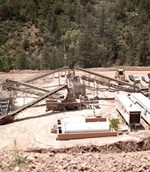ROCKY MOUNTAIN MATERIALS INVESTS IN NEW CRUSHING EQUIPMENT AND LINERS.
By Mark S. Kuhar

|
 |
 |
 |
 |
 |
For years, Tom Smith had been satisfied with the performance of his cone liners. As general manager of Rocky Mountain Materials and Asphalt in Colorado Springs, Colo., Smith has been instrumental in growing the once-small excavation company into a highly successful asphalt and concrete powerhouse that employs up to 400 employees during its busiest season and produces up to 2 million tons of aggregate each year from its five operating quarries. Production was on the rise, and Smith wasn’t looking to change what was unmistakably working.
Consequently, when Smith was approached by Eric Smallwood about switching cone liner brands, Smith was naturally resistant. Smallwood, a product support representative with Power Motive Corp., wanted Smith to try the new S-Series Cone Liners for his KPI-JCI and Astec Mobile Screens Kodiak Cone Crushers.
The S-Series is a competitively-priced line of cone liners and jaw dies exclusively offered by KPI-JCI and Astec Mobile Screens. The product line was developed by Astec Industries foundry experts who specialize in both metallurgy and manufacturing engineering.
Investing in Equipment
Since his first plant purchase in 2003, Smith has steadily continued to invest in KPI-JCI and Astec Mobile Screens equipment, including a Kodiak K300 Cone Crusher, a Kodiak K400 Cone Crusher and a Kodiak Plus K300+ Cone Crusher, along with five horizontal screens, several stacking conveyors and a sand screw.
“When we started upgrading our plants, we wanted plants that would perform. We not only wanted new technology, but we wanted machines that were going to last, machines that were going to run every day and machines that we could work on and that would be supported by our dealer,” Smith said.
Until 2013, Power Motive Corp. only offered another brand of cone liners for its Kodiak Cone Crusher product line, which did not always prove price-competitive with other industry-leading brands. As a result, Rocky Mountain Materials and Asphalt used third-party liners on its Kodiak Cones. With the introduction of the S-Series parts, Power Motive now had a price-competitive, high-performance product that was backed by the OEM.
For Smith, it came down to demonstrable numbers. Prove that the S-Series Cone Liners were more cost-effective and efficient, he challenged Smallwood, and he would switch brands.
Determined and confident in the product line, Smallwood purchased a belt scale and positioned it on the discharge belt of the cone crusher. The scale not only accounted for virgin feed material coming in, but also the recirculating load material. This provided true daily data of tonnage produced, rather than relying on an imprecise estimate of the number of buckets fed or the number of hours on the machine.
The liners were also weighed prior to initial use and upon removal to determine efficacy of wear life. If a cone liner weighs 50 percent or less than its starting weight, it’s considered fully exhausted from use.
Accurate Comparison
Of course, to make a truly accurate comparison, Rocky Mountain Materials had to monitor not only the performance of the S-Series Cone Liners, but also that of competitive products. To come up with a complete comparison, the company also recorded data for RimTec and AmCast liners, and compared tonnage produced, wear life and price of the three brands.
The data revealed that over the testing period, a set of RimTec liners produced 176,000 tons, while a set of AmCast liners produced 175,000 tons. The set of S-Series Cone Liners, however, rocketed production to 208,000 tons, or a 16 percent increase over its competitors.
Additionally, the S-Series Cone Liners outweighed its competitors by up to 500 lb. and was the only brand to achieve 100-percent wear-life consumption, offering the best cost-per-lb. of manganese.
With three to four annual liner changes for each of his three cone crushers, Smith calculates that the switch to S-Series saves him approximately $30,000 each year.
“When you calculate it out to tons per hour and consider the fact that there are fewer liner changes, it proves to be a more efficient product,” Smith said. “For us, it’s a savings on labor and downtime. It keeps the plant running more, which equals more production. These numbers give us confidence in our decision to switch to the S-Series Cone Liners – by using the belt scale, you can’t get more accurate numbers than this.”
“Sixteen percent is a lot of savings,” Smallwood added. “At 3 or 4 percent, maybe it’s not worth changing for, but at 10 or 15 percent, you’ve really go to look hard at it and see if what you’re using is really the best on the market.”
Verifying Production
While verifying production was critical in landing the sale, Smith says he also considered the support that comes with every parts purchase. S-Series parts are backed with the same warranty as other KPI-JCI and Astec Mobile Screens OEM parts and stocked at the factory.
“Your production totally depends on your machine operating every day,” Smith said. “Aside from the quality of parts, the customer service and support we get is vital to us.”
“Two weeks ago, we had a plant that went down on a Sunday,” he continued. “Eric Smallwood came into work on Sunday morning, got the liners for us and delivered them to the pit. He got us back up and running that very day instead of waiting until Monday. With other manufacturers, I’ve had plants that were down for a whole weekend because somebody wouldn’t go to Denver and get parts for us. Power Motive has proven to go above and beyond to keep things going for us.”
Information for this article courtesy of KPI-JCI and Astec Mobile Screens.

